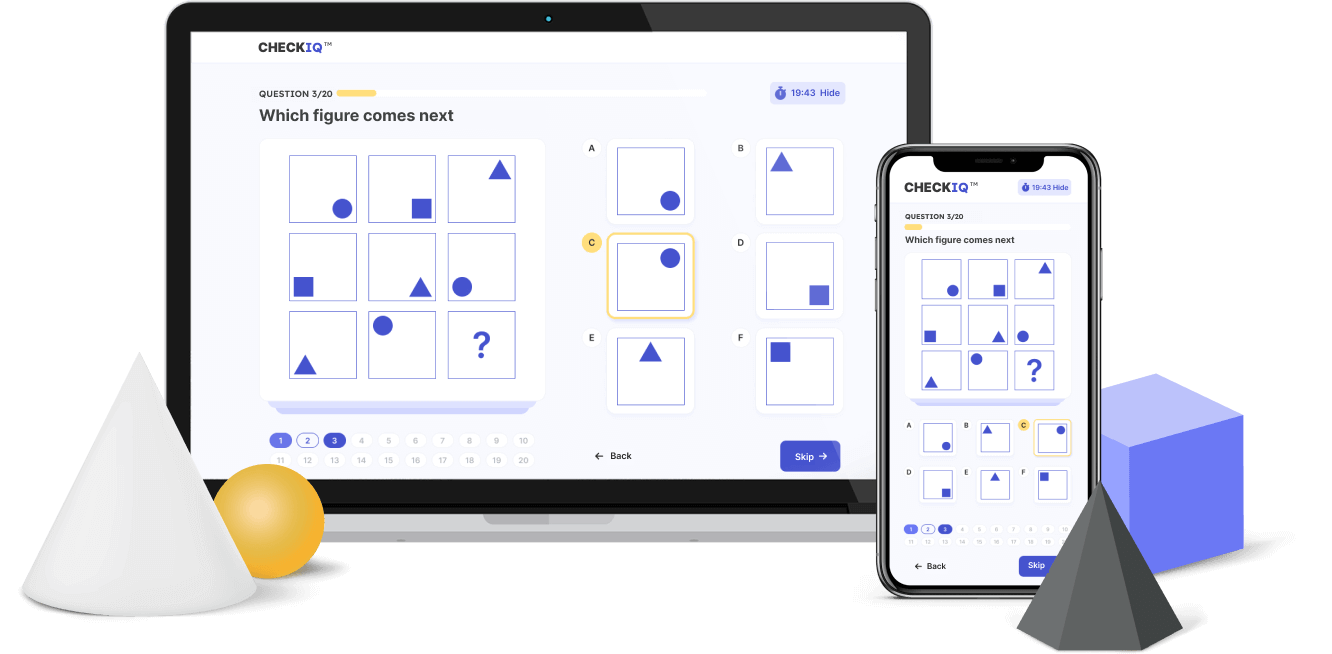Judit Polgar Reportedly Has a 170 IQ
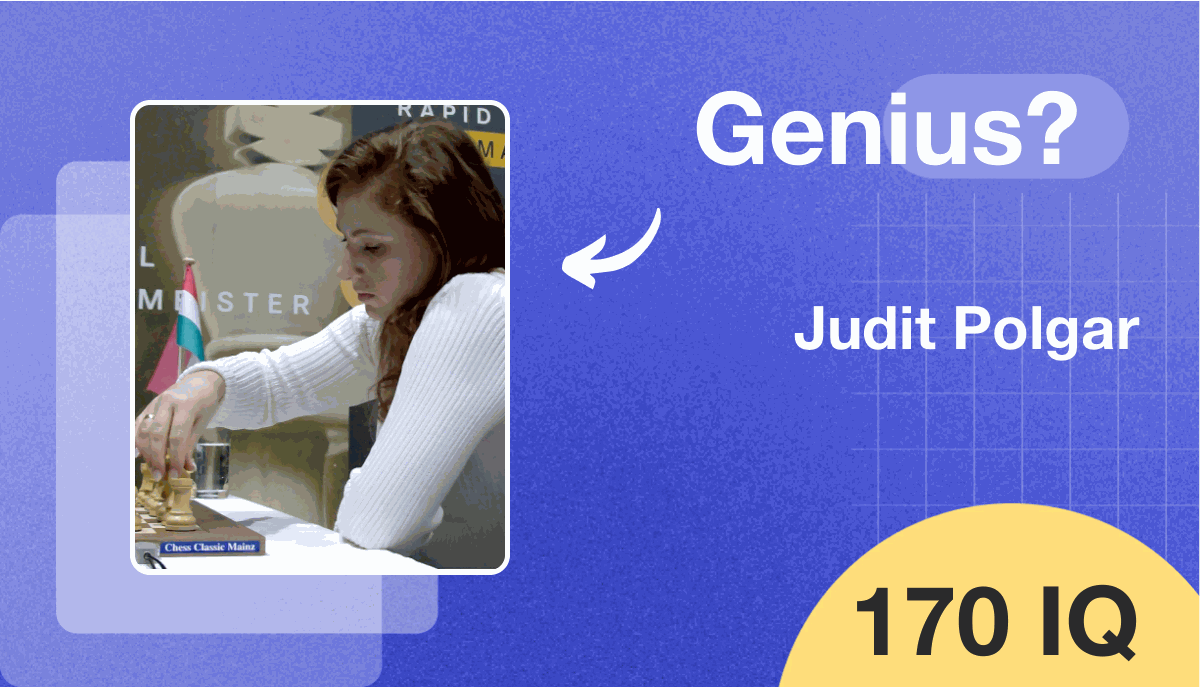
On a quiet summer day in 1973, Hungarian psychologist László Polgár and his young daughter Susan walked into a smoke-filled chess club in Budapest. László, carrying a pillow to prop Susan up to the table, had a bold challenge for the seasoned players: play against his four-year-old. This wasn’t a gimmick; it was the beginning of a meticulously planned educational experiment. Polgár was convinced that genius could be cultivated through focused training from a young age. Chess became the family’s training ground, and, ultimately, it proved to be a place where his daughters would redefine the limits of the game.
By the time the youngest of the three daughters, Judit, emerged on the international chess scene, she shattered preconceived ideas about gender and intellect. At just 15, Judit Polgár became the youngest grandmaster in history, surpassing Bobby Fischer’s record. Her peak ranking at number eight in the world remains a milestone that no other female player has reached.
How Judit refined what it means to be a genius
Judit’s journey was remarkable from the outset. Unlike many female players, she opted to compete exclusively in open tournaments against men, choosing to bypass women’s championships entirely. Her decision wasn’t rooted in a desire to make a statement but came from her father’s unique belief in gender-neutral training. In 2002, Judit made headlines by defeating reigning world champion Garry Kasparov, a player known for his claim that “women by their nature are not exceptional chess players.” For Judit, the game was about skill, strategy, and resilience – traits that know no gender. Despite this, Judit’s path wasn’t entirely without challenges. Many traditionalists in the chess world believed that the highest levels of chess required an innate intellectual capacity presumed to favor men. Yet, Judit’s achievements, alongside the Polgár family’s unconventional approach to education, have fueled a broader discussion about the impact of early, focused training. László’s experiment provided an alternative view on genius, questioning the extent to which talent is shaped by environment rather than genetics.The legacy of Judit Polgár
Though Judit retired from competitive chess in 2014, her impact endures. Today, she is celebrated as the strongest female player in history, a trailblazer who never viewed herself as limited by gendered expectations. Her career has inspired studies, documentaries, and even sparked shifts in how young girls are introduced to competitive games.Judit’s story has become an emblem of the "nature vs. nurture" debate, which is about whetherintelligence is inherited or acquired. She demonstrated how dedication, early training, and family support can elevate one’s intellectual and competitive abilities. Judit Polgár may have started as part of an experiment, but she became a global inspiration. Her life shows that, with the right foundation and encouragement, a person’s potential is bound only by the barriers they choose to ignore.


Average Confidence Level
MediumWe derived Judit Polgar's approximative IQ from the following three sources: Hercules Chess, The CEO Magazine India and Chess Easy.
 Confidence Level: Medium
Confidence Level: Medium
 Confidence Level: Medium
Confidence Level: Medium
 Confidence Level: Medium
Confidence Level: Medium
5 Reasons Why Judit Polgar Is Considered Highly Intelligent
- Grandmaster at 15: Judit Polgar earned the prestigious title of Grandmaster in chess at the tender age of 15. She was the youngest player to do so at the time. Furthermore, she was named "Female Chess Player of the Century" in 2001.
- Defeated World Champions: She won her first international Chess championship at 9 and has triumphed over several reigning World Chess Champions, including Garry Kasparov. With this feat, Polgar has proven her intellectual might on the global stage.
- Top 100 Players: Polgar consistently ranked among the world's top 100 chess players for over two decades. This showcases her enduring skill and strategic acumen.
- Olympic Gold Medalist: Her participation in the Chess Olympiads earned her two team gold medals, along with multiple silver and bronze medals. Her accolades underline her competitive excellence.
- High IQ Score: With an estimated IQ of 170, Judit Polgar's intellectual capabilities are exceptional, placing her among the most intelligent individuals in the world.

Try our accurate online IQ Test. Get your IQ score immediately.
Start IQ Test
How High Is Judit Polgar's IQ Compared to the Rest of the World?
Judit Polgar's IQ of 170 places her in an extremely exclusive bracket, achieved by merely 1 in 500,000 people. This score sails past the entrance benchmarks for many high-IQ societies. For instance, Mensa requires a 130 IQ score (using an IQ test with a 15-point standard deviation). She also exceeds the thresholds for Intertel and the Triple Nine Society, where entry demands scores in the top 1% and 0.1% of the population, respectively. Even more impressively, her IQ meets the criteria for the Epimetheus Society. This group is so elite it only admits those in the top 0.003%. This clearly illustrates her extraordinary intellectual capacity.
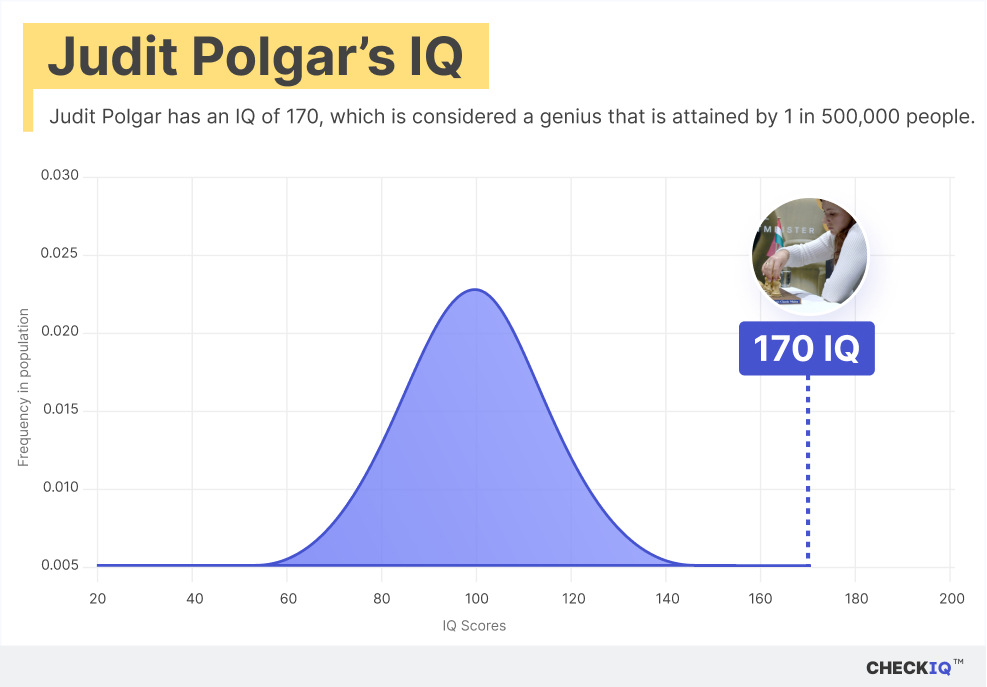
Ranking Judit Polgar's IQ Among Chess Players
Judit Polgar’s intellect shines through, especially when juxtaposed with her peers. For instance, Garry Kasparov and Magnus Carlsen both have IQs of 190 – an astounding number, suggesting a level of cognitive agility and memory that has helped them dominate the game.
Kasparov’s mental resilience and foresight on the board have contributed to his reputation as one of the greatest players, and Carlsen’s precision and instinct have brought him numerous world championships. Judit’s IQ may be slightly lower, but her accomplishments are no less significant, underscoring that mastery involves more than raw intelligence.
Comparing Judit to Bobby Fischer, who boasted an IQ of 180, reveals another layer of distinction. Fischer, known for his fierce competitiveness and brilliant strategies, changed the face of chess with his deep understanding and unyielding dedication to the game. Judit’s own journey shares parallels: her approach is equally meticulous, her tactics equally sharp. Yet, Judit has something Fischer perhaps lacked – a pioneering spirit in a field where she was one of the few female players to break into the male-dominated upper echelon. Her story is one of resilience, challenging conventions while proving that IQ is only part of what makes a grandmaster exceptional.
Chess intelligence isn’t always about reaching the top IQ scores. Players like Emory Tate, with an IQ of 145, have achieved brilliance on the board through sheer skill and creativity, proving that success in chess comes from various intellectual avenues. Tate’s tactical vision and unexpected maneuvers made him a remarkable player despite an IQ that might seem modest compared to the titans of the game or even to his son's Andrew Tate's alledged IQ of 148. Judit’s IQ is far higher, but her success aligns with Tate’s in showing that intuition, persistence, and a passion for chess can overcome any numerical measurement of intelligence.
Even Hikaru Nakamura’s IQ, reportedly around 102, demonstrates that raw intelligence isn’t always the defining factor for chess success. Nakamura’s strategic thinking, speed in online blitz matches, and knack for outmaneuvering opponents prove that every player brings a unique set of strengths to the game.
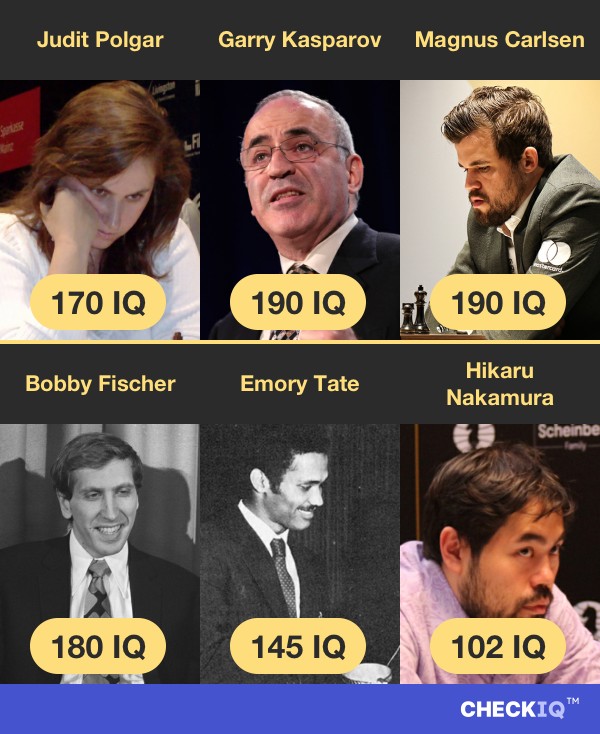
Do you think Judit Polgar's 170 IQ accurately reflect Her's brain power? Scroll down and let us know in the comments below!
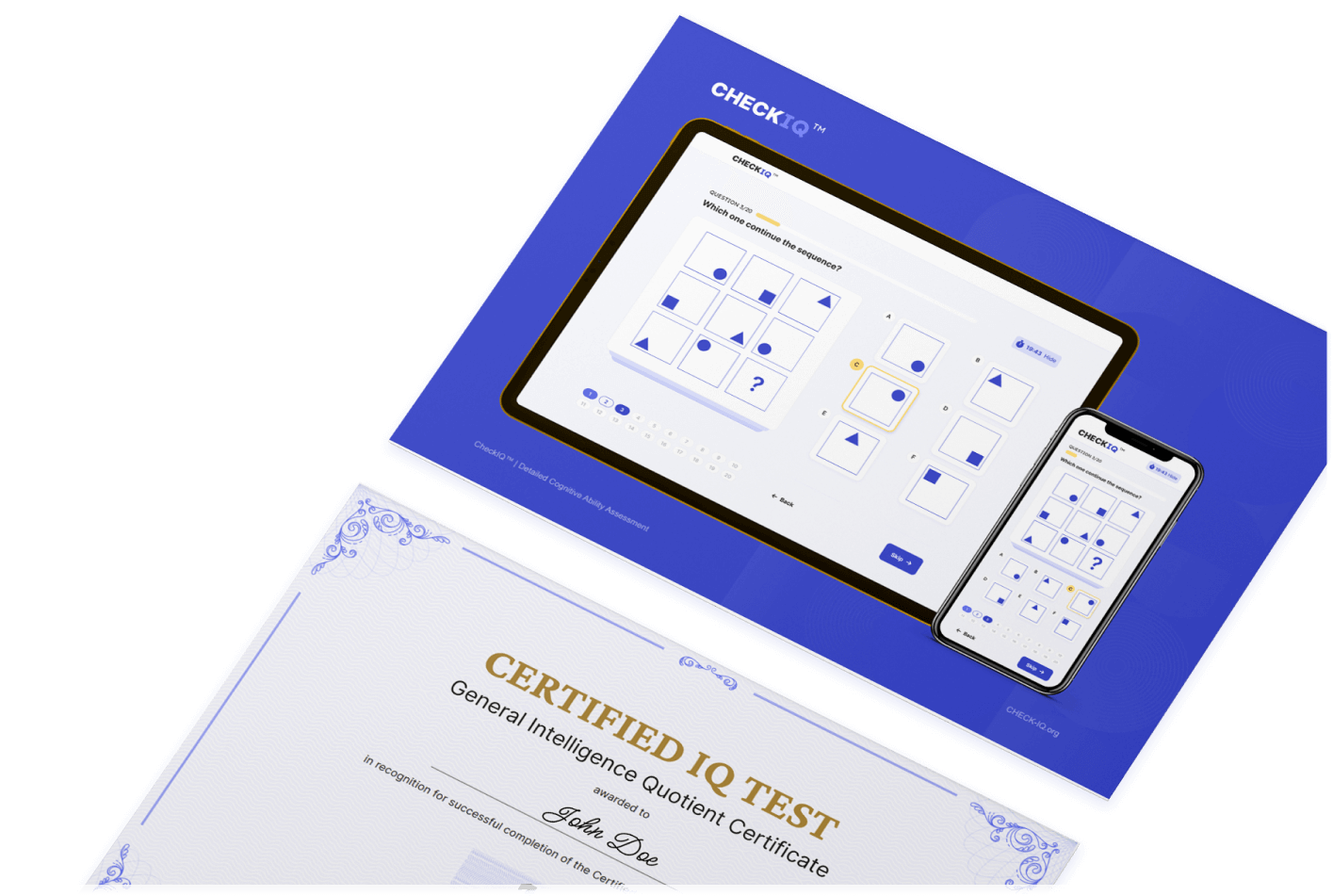
Discover the IQ of Other Famous People
-
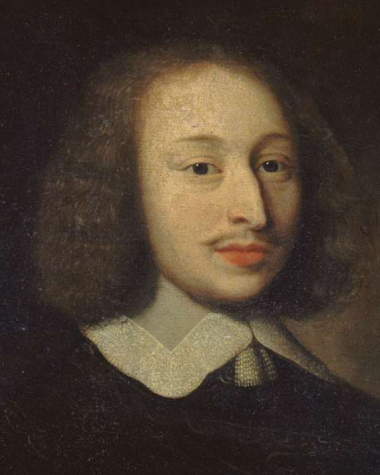 Blaise Pascal180 IQ
Blaise Pascal180 IQ -
 Kyrie Irving150 IQ
Kyrie Irving150 IQ -
 Marilyn Manson155 IQ
Marilyn Manson155 IQ -
 Mayim Bialik156 IQ
Mayim Bialik156 IQ -
 Erik Kuselias130 IQ
Erik Kuselias130 IQ -
 Charles Manson117 IQ
Charles Manson117 IQ
